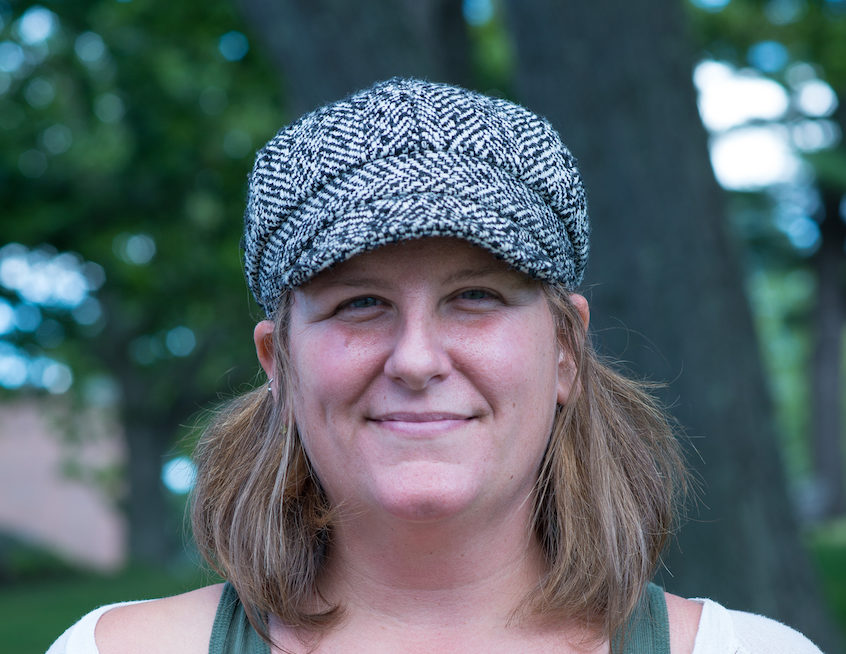Kate Bishop
Evaluation Consultant at Winrock International; Visiting Assistant Lecturer at University of New England, Department of Environmental Studies

Education: Ph.D. in Geography and Anthropology (Indiana University), M.A. in Anthropology (Indiana University), B.A. in French (Bates College)
Describe your job. What are some of the most important tasks or duties for which you are responsible?
In my role as an evaluator, I am responsible for measuring, analyzing, and reporting on the results of international agricultural development projects. I train, advise, and lead multicultural teams in mixed-method research projects such as baseline studies, qualitative assessments, midterm and final evaluations, and impact evaluations. I also help project staff in field offices to create and implement performance management plans and develop research budgets. I have supervised evaluations of projects in Burkina Faso, Cameroon, Ghana, Guinea-Bissau, Liberia, Mali, Niger, and South Africa that were funded by the United States Agency for International Development, the United States Department of Agriculture, and various foundations. This work is important because it helps project funders, including U.S. taxpayers, to understand whether they have achieved programmatic goals promoting agricultural development. Equally important, the research contributes to reconceptualizing and refining project strategies to expand outreach and improve outcomes for everyone involved.
What attracted you to this career path?
I joined the Peace Corps after I graduated from Bates College with a degree in French. Working in Africa and teaching others about Africa has always been very important to me. Working with NGOs was a great way to work towards social and environmental justice, learn foreign languages, and gain diplomacy skills.
How has your education/background in geography prepared you for this position?
I entered grad school after working in the field of international development for a decade. One of my goals in studying geography was to improve my research skills, in particular methods and theories appropriate to evaluating programs in Africa. While I gained a lot of practical knowledge as an applied researcher, it was not until I studied geography that I was able to understand and analyze important dimensions of development that are often ignored or understudied in professional research such as political economy, human-environment interactions, culture, and history.
What geographic skills and information do you use most often in your work? What general skills and information do you use most often in your work?
Geographic skills important to this work include the ability to use mixed data collection methods, to integrate qualitative and quantitative data, to analyze human-environment interactions, and to conceptualize processes through time and across space. More generally this work requires: the ability to develop and implement culturally-appropriate research design; foreign language skills; the ability to lead and work as a team member; strong writing and presentation skills; and, resourcefulness and adaptability in a challenging fieldwork environment.
Are there any skills or information you need for your work that you did not obtain through your academic training? If so, how/where did you obtain them?
I began learning French in high school and had already spoken the language for years before entering graduate school. I began studying Portuguese during my master’s program, and it was incredibly helpful in expanding my knowledge of Lusophone Africa. In addition, I had a lot of experience in cross-cultural settings prior to my academic training in geography. Building interpersonal and communication skills requires a life-long effort.
Do you participate in hiring, screening, or training of new employees? If so, what qualities and/or skills do you look for?
When I am part of the hiring process some important candidate qualities I look for include knowledge and experience in the field or position, foreign language competency, writing skills, and creativity. For program evaluation positions in particular, I look for attention to detail, ability to conceptualize program strategy and rationale, communication skills, and generally outgoing/approachable personality.
What advice would you give someone interested in a job like yours?
My advice would be to apply to the Peace Corps or another long-term service or teaching position in a developing country in order to obtain in-depth field experience. I would study at least one foreign language. Become familiarized with the history, politics, arts, and geography of a country or region of interest. Take a home-office position with an NGO in Washington, D.C. or elsewhere as a Monitoring and Evaluation Associate or Coordinator and build a career from there. Importantly, enter this profession with a humble attitude. You will find that your counterparts and coworkers in developing countries are often much more knowledgeable than you may expect, and that research in the field of international development is always a learning experience.
What is the occupational outlook for career opportunities in your field/organization, esp. for geographers?
Due to USAID’s emphasis on strong program evaluation across all projects, the field has been growing fairly rapidly for nearly a decade. There appears to be plenty of opportunity for applied researchers for U.S. Government-funded programs for now, although changes in the State Department related to the policies of the current administration may lead to shifts in funding priorities. Other opportunities exist at multilateral institutions such as the World Bank, the United Nations Development Program, and the Food and Agriculture Organization of the UN, as well as at bilateral institutions and foundations.